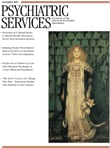News Briefs
New APA practice guideline on dementia treatment: The American Psychiatric Association has released its Practice Guideline for the Treatment of Patients With Alzheimer's Disease and Other Dementias. Part A of the guideline, "Treatment Recommendations," is being published as a supplement to the December issue of the American Journal of Psychiatry ( AJP ). The 59-page Part A, which includes 389 reference citations, addresses formulation and implementation of a stage-specific treatment plan, including diagnostic evaluation and referral, assessment and monitoring, enhancement of the safety of the patient and others, education and support for patients and families, and psychosocial and pharmacological treatments. It discusses specific issues that influence the plan, including demographic and social factors, co-occurring conditions, and features of the treatment site, such as the patient's home or a long-term facility. Part B, "Background Information and Review of Available Evidence," and Part C, "Future Research Directions," are not included in the AJP supplement but are provided with Part A in the complete guideline, which is available online through the American Psychiatric Association (www.psych.org) and in print format in compendiums of APA practice guidelines published by American Psychiatric Publishing, Inc. (www.appi.org).
AMA honors Paul Appelbaum: Paul S. Appelbaum, M.D., has received the American Medical Association (AMA) 2007 Isaac Hays, M.D., and John Bell, M.D., Award for Leadership in Medical Ethics and Professionalism. The award, which was presented at the interim meeting of the AMA House of Delegates in Honolulu, recognizes Dr. Appelbaum's many contributions to psychiatry, in particular to medical ethics. Among his accomplishments as a leader in ethics in psychiatry are creation of a mechanism for peer review of psychiatric expert testimony, development of ethical standards for psychiatric involvement in death penalty proceedings, and leadership in the formulation of the American Psychiatric Association's position on psychiatric participation in interrogations (an approach subsequently adopted by AMA). His work in forensic psychiatry concerns the practical application of medical ethics within the framework of the justice system. Dr. Appelbaum is Dollard Professor and director of the Division of Psychiatry, Law and Ethics for the Department of Psychiatry, Columbia University College of Physicians and Surgeons; he is also a faculty associate at the Columbia University Center for Bioethics. He was previously A. F. Zeleznik Distinguished Professor and chairman of the Department of Psychiatry and director of the Law and Psychiatry Program at the University of Massachusetts Medical School.
New award named for Wayne Fenton: In September 2006 Wayne Fenton, M.D., associate director of the National Institute of Mental Health and a member of the Psychiatric Services editorial board, was killed by a severely mentally ill patient whom he was treating in his private office. Schizophrenia Bulletin has established the Wayne Fenton Award for Exceptional Clinical Care. The annual award will honor an individual who embodies Dr. Fenton's devotion to patient care and to innovative approaches and his exceptional effort. The September 2007 issue of Schizophrenia Bulletin includes commentaries by several of Dr. Fenton's colleagues that describe the impact of his work in many spheres, including public health, industry, academic neuroscience, and recovery from mental illness. An anonymous first-person account by one of his patients conveys the depth of understanding and warmth that Dr. Fenton brought to the treatment relationship. The September issue also announces the first winner of the Fenton Award—the late Gerard Hogarty, M.S.W., a pioneer in psychosocial treatments for schizophrenia, who also died in 2006—and includes an article describing Mr. Hogarty's contributions and the evolution of his work. The September issue and information about applying for the Fenton Award are available on the Schizophrenia Bulletin Web site at schi zophreniabulletin.oxfordjournals.org.



